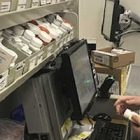Safety has been on my mind this week. It’s one of those concepts that, when related to patient advocacy and care management, can be applied in so many ways, with not so many easy answers.
What kind of safety? Physical safety, of course. AND financial safety.
Whose safety? Your clients’ safety, of course. AND yours.
The questions aren’t so much about what is safe, or what isn’t. The questions are about judgment, timing, and consequences, and recognizing safety issues when the problems are obvious – vs – those times that are less obvious that we might miss all together – and what will happen if we aren’t paying attention.
My safety consciousness was raised recently during a session with the Patient Advocate Certification Board, as we worked on questions for the upcoming exam. It was like one of those V-8 moments, as we all beaned our foreheads with the heels of our hands and said, “Wait! We haven’t included patient safety!”
 Yes – patient safety – among the LAST attributes we should ever skip for advocacy knowledge and action! Yet, as extremely important as it is, it had not been included in the list of competencies.
Yes – patient safety – among the LAST attributes we should ever skip for advocacy knowledge and action! Yet, as extremely important as it is, it had not been included in the list of competencies.
We had missed it. (We corrected that missing piece immediately. See the PACB post on this topic.)
But it got me thinking…. In what ways do we advocates need to be attentive to patient safety for our clients. And what might we be missing?
And that got me thinking further…. In what ways do we advocates need to be cognizant of our own safety? And what might we be missing?
Some safety “rules” are so “look both ways before you cross the street” that we hardly give them thought. Most smart advocates realize, for example, that they should never consider driving a client to an appointment. It’s potentially unsafe for the client (what if they fall? what if they slam a finger in the car door? what if you’re in an accident on the way?). It’s also unsafe for the advocate because if any of those things happen – that’s a lawsuit.
Some safety considerations are those an advocate should always – ALWAYS – be raising with clients, such as staying safe in the hospital or confirming prescriptions are the right dose with the right instructions as ordered (and maybe being given to the right patient!) These are obvious – and yet, I have to wonder… are advocates attending to them?
And then there are the safety considerations for ourselves, such as not visiting a new client in their home for the first time alone. We’ve seen (Ripped from the Headlines!) real estate agents lose their lives to this kind of tactic. Are we, as advocates, just assuming that everyone who calls us and wants to hire us has the best of intentions?
Danger!! Don’t assume anything.
When Safety Isn’t What You Think It Is
Let’s talk financial safety…. for clients.
Last week, APHA hosted its Expert Call-in where the topic was out-of-network medical bills, how to prevent them for clients, and then how they should be handled (IF they can be handled) if a client receives one.
Not pretty! And very expensive…. and an obvious place we advocates need to know about the possibilities and pitfalls to help our clients either avoid them or take care of them. If you think that because medical billing isn’t one of your services – think again – because the prevention of these bills is a financial safety question – absolutely a responsibility you can, and should, shoulder.
Now let’s talk financial safety…. for advocates.
There were two aspects of this that come to mind for me – one much less obvious than the other.
The first is financial safety as it regards liability insurance. So many people think they can skip this… after all, they know how to do things well and right, and how would they ever get in trouble for HELPING someone? What they fail to realize is that
- they don’t control what people think, and that’s all it requires – that someone THINKs they did something wrong. And…
- that not every client has the best of intentions.
We’ve learned recently that there are people out there who are engaging advocates to do things for them that are either impossible (and they already know that) or illegal. Too many of us aren’t savvy enough to identify them on the front end. Enough said.
And here’s another surprise – a financial concept for you that you might not think of in just this way….
As a reader of this blog, if you haven’t done so already, you may be considering advocacy as an independent, self-employed venture. But… you hesitate… because you’re afraid of the RISK of stepping away from a paycheck. You think of the paycheck as a form of safety.
Perhaps there is another way to look at it.
When the recession hit; when the economy tanked in the mid-2000s… we all learned better. Hundreds of thousands (millions?) of people were laid off, losing what they had regarded as a “safe” job.
No one can lay you off when you are self-employed.
And, ask yourself, is a job “safe” if you truly hate it? So many of the potential advocates I talk to are frustrated, exhausted, angry – they are being asked to do things in their workplace that they have negative feelings about. That all seems dangerous – to one’s self-regard, one’s peace of mind, one’s satisfaction and happiness in life. How safe is it if it’s an assault to your well-being?

Safety – in all its forms – is our responsibility as advocates for our clients AND for ourselves. When we ignore or disregard it, it can have grave consequences. I have shared here a random sampling of the thoughts that have been swimming through my head about safety and advocacy. Maybe you can add other safety thoughts below?
Yes, it’s true: Safety does not happen by accident.
- Is Grampa Packin Heat? And Other Safety Considerations for Advocates
- Don’t Let These Headlines Be About You
- Ripped from the Headlines… a Warning for Health Advocates, Too
- We Interrupt This Thread for News About a Potential Patient Advocacy Lawsuit
LEARN ABOUT APHA MEMBERSHIP | MORE REASONS PATIENTS NEED ADVOCATES | MASTER LIST OF PRACTICE RESOURCES





